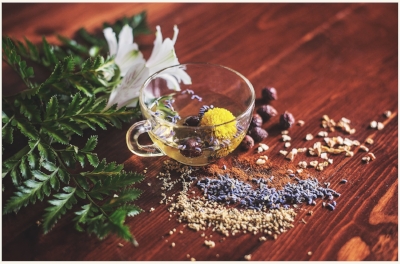
Q: Whenever I am sick or have pain, I am so hesitant to go immediately to the pharmacy, as I would rather not be constantly on medications. I don’t know much about herbal medicine, but I am thinking it might be healthier for me. Is this true? And do they really work?
A: Herbal medicine, also known as herbalism or botanical medicine, is a medical system based on the use of plants or plant extracts that may be eaten or applied to the skin. Since ancient times, herbal medicine has been used by many different cultures throughout the world to treat illness and to assist bodily functions. Herbal remedies are administered in the form of extracts, tinctures, capsules, tablets, and teas, and they may be recommended by healthcare practitioners of many different disciplines as a practical way to address a wide variety of medical conditions.
In many cultures, herbal medicine has been the main method of treating illness for thousands of years. It is only in recent times, and in Western countries, that people have been experiencing the phenomena of overuse and resistance to antibiotics, steroids (which are used to decrease inflammation), anti-depressants, and ADHD drugs.
Herbs have been given for all medical issues, from anemia to yellow fever. In the past, people really didn’t know why or how herbs healed. Fairly recently, worldwide scientific studies have shown that herbs and plants contain various chemical constituents, or active ingredients, that target specific organ systems. They heal by nourishing blood, bones and organs, and by regulating bodily systems. Studies prove that the active ingredients in herbs and plants have properties ranging from antibiotic, antiviral, anti-inflammatory and antifungal to mood-stabilizing, hormone-balancing and more. (Israel is now in the forefront of scientific research on this topic. Powerful antibacterial, anti-fungal, antioxidant, parasite-fighting or immune-boosting substances have been found in native Israeli plants such as Palestine oak, terebinth, Mediterranean stink bush, chamomile, carob, sage, nettle and marigold, to name just a few.)
One way to get herbal medications is to go to an herbalist. Most visits to an herbalist begin with a consultation about your past and current health history, your dietary and lifestyle practices, and other factors related to your health issue. Then, a tailored formula is created to treat all of your specific issues. Health food stores and pharmacies also sell herbal supplements and formulas. They can promote healing, but might have the disadvantage of not being specific enough. Also, you might end up buying many various herbs and still not give yourself a formula that suits your individual needs.
As far as safety, we do know there are drug/herb interactions. An experienced herbal practitioner will ask you which medicines you are on and find the herbs that do not interfere with them. The practitioner should be familiar enough with which herbs can be taken with which drugs. For example, supplemental garlic, ginger and turmeric can cause problems if taken before surgery, as these herbs thin the blood and can cause excess surgical bleeding.
Herbs work because their healing properties can be readily absorbed and used by our bodies as foods as well as specifics for disease. No synthetic substances can replicate the complexity of plant-based constituents, which may include oils, vitamins and minerals. Components of the plant can heal illness and can also support weakness in the body or aid the removal of toxins, contributing to the low incidence of ‘side effects’ experienced by users of herbs. As we come to understand the full complexity of the body, plants appear more suited to support health than the single ‘magic bullets’ of pharmaceutical drugs.